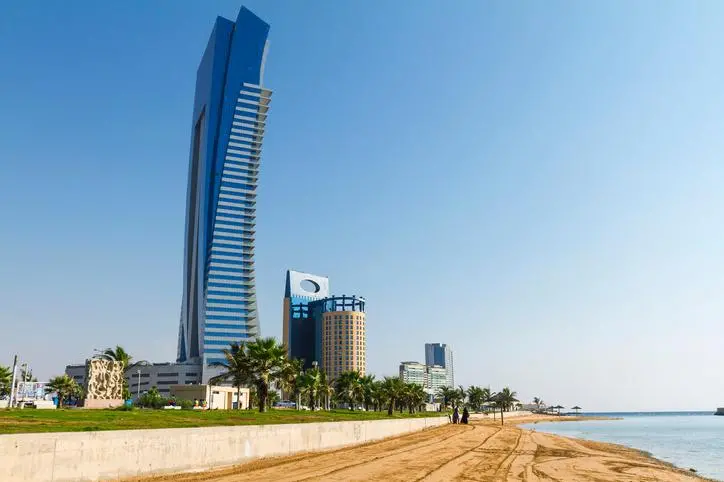PHOTO
The General Entertainment Authority was established in 2016 with a mission to “provide recreational opportunities for all segments of society...to enrich lives and to spread joy.” It is doing just that with spectacular mega-events like Riyadh Season.
And with the relaxation of social norms in the Kingdom, music has become not just an integral part of daily life, but a dynamic new economic sector.
Numerous KSA-based companies are getting in on the act, via a spectrum of platforms: TV, Internet, social media, streaming services such as Lebanon-based Anghami (focused on Middle East-origin music) and live performance.
Saudi promoters such as Benchmark and AK Events have brought major international stars to local audiences. Mariah Carey, the Black Eyed Peas and Enrique Iglesias have all performed in the Kingdom, prior to the COVID-19 epidemic putting a temporary halt on public gatherings.
Jeddah-based Makan Music Center, which offers a full range of musical services, is a focal point of the Kingdom’s burgeoning music scene.
The center’s General Manager Shaher Karkashan, 32, founded the center with his musician colleagues in 2018.
He told Arab News: “Our goal was to create a hub for musicians. And our vision is to enable an individual to go the full circle with us — from learning an instrument to recording original material and then presenting his or her music to a live audience.
“That’s the goal, for both boys and girls — and surprisingly, over 60 percent of our clients are female.”
Such activities are crucial for the incubation of Saudi musical performers in order to supply high quality content to an industry hungry for new talent.
The center was initially launched with just two rooms — a recording studio and a jamming and learning space.
Three years on, it occupies an entire 400-square meter building divided into an eight-room teaching area, a 250-capacity auditorium and a recording studio.
Clients can learn a variety of instruments, including guitar, violin and drums, along with vocals. The typical age of musicians is 15 to 40, although some are aged 50 and above.
The center also provides equipment, talent and management services for indoor and outdoor corporate events, staged in malls and other public spaces, attracting audiences of up to 2,000.
Karkashan said that as the center has grown, it has become a more professional outfit with a robust business model and several income streams: tuition, ticketed concerts, artist management, equipment hire and corporate events.
He said: “We started with five employees — and now we are 20 and growing. We have six departments, including human resources, accounting and sales, and we’re hiring more people.”
While the KSA’s music industry – specifically live performance — was negatively impacted by the COVID-19 pandemic, the future outlook appears positive. With the Kingdom’s health situation returning to normal, forthcoming live events include the appearance of Justin Bieber, A$AP Rocky and Jason Derulo, who are set to headline post-race concerts at this weekend’s inaugural Formula 1 Grand Prix in Jeddah. Industry players are hoping that this progress will not be impeded by the omicron COVID-19 variant.
Health conditions permitting, Karkashan and his associates are also planning a large new year concert as part of the port city’s Jeddah Season festivities.
Such activities were unheard of in the Kingdom even a few years ago, and Karkashan noted that the changes stemmed from the Vision 2030 reforms.
“Saudi Arabia had some major artists back in the 1980s, after which there was a huge 30-year gap,” he added.
“Then we started seeing a few Saudis performing on TV shows like ‘Star Academy’ and ‘Arab’s Got Talent’ — but they went on to work in Kuwait or the Emirates, because there was no opportunity for them to develop in Saudi Arabia.
“Now things have changed. The Ministry of Culture is involved, there’s the Entertainment Authority, even a Music Authority, and they are all helping to develop the KSA’s music industry.
“I think potentially big names will soon emerge in Saudi Arabia. They are under development now, and we will probably see them go mainstream in around 2023.”
Some of Makan’s clients have come together to form bands — one called Robin and another Bad Reception — and the center has also allowed more established acts, such as death metal outfit Wasted Land, to record and perform their own material.
Karkashan said that he is optimistic about the future of Makan as well as Saudi Arabia’s music sector as a whole.
He pointed out that he was focused on three main areas of growth: artist management, staging bigger outdoor events and opening new centers in Riyadh and other cities in the Kingdom.
“Five years ago, it was all very different. But now aspiring musicians have our full support as well as support from the media and the government.
“And social media really opens up huge possibilities. Many young people are passionate about learning music or starting a band or a career in music, and this is definitely the right time to do it.”
The Saudi music industry is slated to see exponential growth over the next decade and the Makan Music Center will surely play a part in that, both artistically and commercially.
Copyright: Arab News © 2021 All rights reserved. Provided by SyndiGate Media Inc. (Syndigate.info).





















